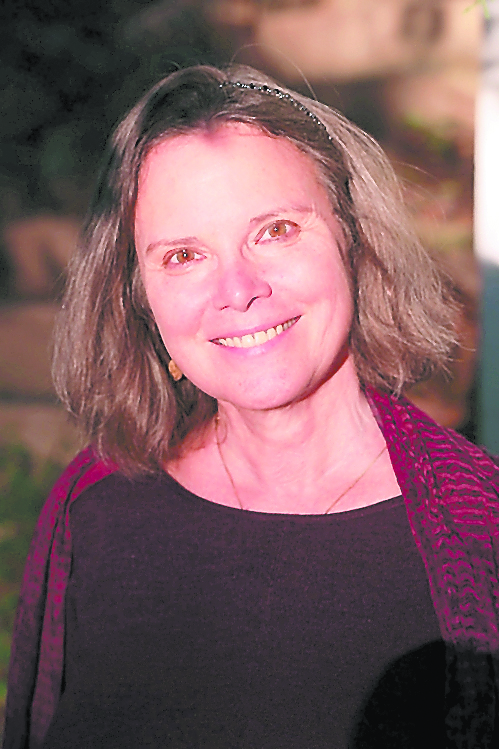How does the poet react to war, displacement, imprisonment and even genocide? What words will they use — even if the language of oppressors — in trying to understand that experience?
Poet Carolyn Forché calls that the “poetry of witness,” and it has been the subject of anthologies she’s edited from “Against Forgetting: Twentieth Century Poetry of Witness,” published in 1993, to the more recent “Poetry of Witness: The Tradition in English, 1500-2001,” published this year with co-editor Duncan Wu.
“It’s a way of reading, a mode of reading works in the aftermath of extremity,” Forché said in a phone interview Tuesday from her Maryland home. “Works written in the aftermath of wars, incarceration, forced exile — for the legibility of the mark of that experience, regardless of the subject.”
Forché, 64, visits Alaska this week. At 6:30 p.m. Thursday as part of Kachemak Bay Campus’ Visiting Writers Series, she does a reading and talk at KBC Pioneer Hall. This weekend she conducts a workshop for 49 Writers at Tutka Bay Lodge, “Writing on Tutka Bay: New Poems, New Passages.” That workshop is sold out.
It’s not her first visit to Alaska. Forché has done a previous Tutka Bay Lodge residency in 2013 with food writer Molly O’Neill, but first came to Alaska in the early 1980s to teach poetry in the prisons. Based in Juneau, she taught at the Lemon Creek prison there as well as prisons in Fairbanks, Palmer and Eagle River. She also taught at schools along the Yukon River.
“I’m really thrilled to be coming back to Tutka Bay Lodge — not at all like a prison,” she said. “I’ve seen two very different Alaskas, I think.”
Born in Detroit, Forché graduated from Justin Morrill College, Michigan State University, East Lansing, in 1972. Her first book of poetry, “Gathering the Tribes,” 1975, written at age 24, won the Yale Series of Younger Poets Award. On a Guggenheim Fellowship, she traveled to El Salvador with Amnesty International during that country’s brutal civil war. Out of that came “The Country Between Us,” 1981. In that book, the Los Angeles Times said her poems “chronicle the awakening of a political consciousness and are themselves acts of commitment.”
That poetry also led her to think about poetry written in extreme circumstances and the poet’s response to the state — an idea that came about in the critical aftermath to “The Country Between Us.”
Poetry as witness isn’t protest poetry or political poetry.
“It’s a subtler reading,” she said. “The assumption is that one does not pass unscathed through such experiences, in some way implicitly or explicitly in the reading.”
“Against Forgetting” came about when she wanted to teach poetry in translation from around the world.
“So I started reading, and this is what I found,” she said.
“Against Forgetting” starts with poems about the Armenian massacre and ends with poems about the Tiananmen Square protests in China. In “Poetry of Witness,” edited with Georgetown University colleague Duncan Wu, they wanted to read through the English language tradition going back 500 years to see if the classic poets also wrote about extremity.
“We found out most of the poets in the English language tradition qualified,” she said.
Forché isn’t interested in the themes of extremity — war poems and prison poems, for example.
“I’m more interested in what happens to the language of poets,” she said.
She mentioned the Romanian poet Paul Celan, imprisoned by the Nazis in a forced labor camp. Celan wrote poetry in High German, the language of the people who tried to annihilate him.
“He reinvented a new German language, as if walking around picking up scraps of German,” she said.
The poetry of witness also isn’t necessarily about overcoming trauma, she said.
“However, there are people who do find it enormously helpful in their healing process,” she said. “Poetry is very powerful. It’s musical language that emerges from a very deep place in the human mind.”
When teaching at Lemon Creek in the 1980s, she got a sense of that, she said. Her students had read poems by political prisoners, about incarceration. In class, she found her students sullen and in a mood. Normally animated, she didn’t quite know what had gone on.
“It was a reaction to the poems I had given them. They realized they were poets imprisoned for matters of conscience. They realized they were in prison for very different reasons,” Forché said. “They had a moment of recognition of what had put them there, but also they had a possibility of turning their lives around. Most of them, in fact, did.”
Forché said she’s excited to be coming back to Alaska and Kachemak Bay. She remembered her first visit fondly, Forché said.
“It was a very exciting and thrilling time for me,” she said. “I was young, Alaska — the glaciers were still thick and blue and extraordinary.”
Forché also said she’s glad to be back at Tutka Bay Lodge.
“I think it’s a wonderful thing that a lodge like that does that for the arts and pays attention to literary culture in that way,” she said. “I’m excited to meet the Homer community. Alaska has always been dear to my heart. I’ve always wanted to come back. It just never happened, and now, twice in a year.”
Michael Armstrong can be reached at michael.armstrong@homernews.com.
Carolyn Forché
Reading and Talk
When: 6:30 p.m. Thursday
Where: Kachemak Bay Campus, Pioneer Hall
For more information
and poetry samples:
www.poetryfoundation.org/bio/carolyn-forche#about


